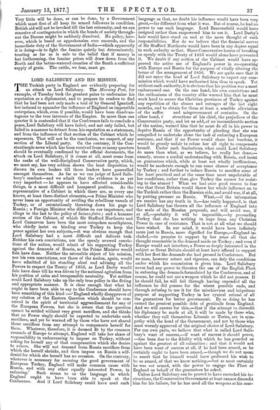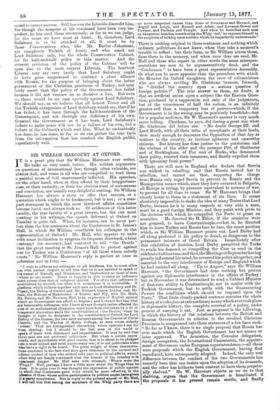LORD SALISBURY AND HIS MISSION.
his position of calm and irresponsible neutrality. Yet neither could Lord Salisbury take up the only true policy in the fitting and appropriate manner. It is clear enough that what he ought to have been able to say to the Conference should have been something of this kind England wholly disapproves of any solution of the Eastern Question which should be con- ceived in the spirit of territorial aggrandisement for any of the European Powers, but she is aware that the question cannot be settled without very great sacrifices, and she thinks that no Power singly should be expected to undertake such sacrifices, and yet be warned off by those who have not shared those sacrifices from any attempt to compensate herself for thew. Whatever, therefore, it is deemed fit by the common counsels of Europe to attempt, England will take her share of responsibility in endeavouring to impose on Turkey, without asking for herself any of that compensation which she denies to others. She will not demand from Russia sacrifices from which she herself shrinks, and then impose on Russia a self- denial for which she herself has no occasion. On the contrary, whatever is necessary for securing the good government of European Turkey, England will make common cause with Russia, and with any other equally interested Power, in enforcing.' Such seems to us the language in which England ought to have been able to speak at the Conference. And if Lord Salisbury could have used such language as that, no doubt his influence would have been very great,—far different from what it was. But of course, he had no power to use such language. Lord Beaconsfield would have resigned rather than empowered him to use it. Lord Derby's hair would have stood on end at the mere thought of such responsibilities. Nor do we believe that the financial nerves of Sir Stafford Northcote would have been in any degree equal to such audacity as that. Sheer Conservative horror of breaking so openly with the Treaty of 1856 would alone have prevented it. We doubt if any section of the Cabinet would have ap- proved the active use of England's power in co-operating with Europe and Russia for the purpose of vitally altering the terms of the arrangement of 1856. We are quite sure that it did not enter the head of Lord Salisbury to expect any com- mission which would have authorised him thus to speak. Yet without such authority, it is obvious that his position was a most embarrassed one. On the one hand, his own convictions and the enthusiasm of the country alike warned him that he must work hard to secure the Christian provinces of Turkey against any repetition of the abuses and outrages of the last eight months, and to obtain for them at least a sensible alleviation of the suffer. and misgovernment of centuries. On the other hand, t' atructions of his chief, the prejudices of the
Conservative party, and let us add, of no inconsiderable section of the nation, warned him that he must do all in his power to deprive Russia of the opportunity of pleading that she was compelled to undertake alone the task of enforcing a European sentence, and that if no Power would share her burdens, it would be grossly unfair to refuse her all right to compensate herself. Under such limitations, what could Lord Salisbury do more than what, as we believe, he really has done,— namely, secure a cordial understanding with Russia, and insist on guarantees which, while at least not wholly inefficacious, would be moderate enough to run some chance of acceptance by Turkey ; and further to induce Russia to sacrifice some of the least practical and at the same time most unpalatable of her conditions, rather than give Turkey the excuse for resist- ing to the utmost ? What we had once good reason to fear was that Great Britain would throw her whole influence on to the Turkish rather than the Russian side, and avoid war, if at all, by putting pressure on Russia. What,—if the information we receive has any truth in it,—has really happened, is that Lord Salisbury has thrown all the influence of England into the scale of the Russian proposals, and will avoid war, if at all,—probably it will be impossible,—by persuading Turkey that she has nothing to hope from any Christian Power in case of resistance. That is not at all what we should have wished. In our mind, it would have been infinitely more just to Russia, more dignified for Europe,—England in- claded,—to promise to support by her arms all that she thought reasonable in the demand made on Turkey ; and even if Europe would not interfere, a Power so deeply interested in the subject as Great Britain should at least have offered to support with her fleet the demands she had pressed in Conference. But no man, however astute and vigorous, can defy the conditions under which his commission is given him. Lord Salisbury never had any power to threaten the use of the English Fleet in enforcing the demands formulated by the Conference, and of course, he could not use a weapon which he did not possess. If he should fail, he will fail through having expended all the influence he did possess for the wisest possible ends, and
through refusing to use it for the mischievous and iniquitous purpose of supporting Turkey in her cynical refusal of all the guarantees for better government. By so doing he has earned the greatest possible debt of gratitude from England. And we will answer for this,—that if the attempt to discredit his diplomacy be made at all, it will be made by those who, whether they call themselves Liberals or Tories, are in sym- pathy with the head of the Government, and not by those who most warmly approved of the original choice of Lord Salisbury. For our own parts, we believe that what is called Lord Salis- bury's want of success,—if want of success it should prove, —has been due to the fidelity with which he has guarded us
against the greatest of all calamities ; and that it would not have been want of success at all, if he had been armed, as he certainly ought to have been armed,—though we do not mean to assert that he himself would have professed his wish to be so armed, of that we know nothing,—but as most certainly he was not armed, with the power to engage the Fleet of England on behalf of the guarantees he asked.
Unless Lord Salisbury can be proved to have exceeded his in- structions, the Conservative Government at least cannot discredit him for his failure, for he has used all the weapons at his com- mend to ensure success. Still less can the Liberals discredit him, for though the weapons at his command have been very im- perfect, he has used them strenuously, as far as we can judge, for the cause we have most at heart. If, therefore, Lord Salisbury is to be attacked at all, it must be by those Conservatives who, like Mr. Butler-Johnstone, are completely Turkish at heart, and who assail not Lord Salisbury only, but the whole Conservative Cabinet,
for its half-and-half policy in this matter. And the severest criticism of the policy of the Cabinet will be open also to the most earnest Liberals. The heartiest Liberal may say very justly that Lord Salisbury ought to have gone empowered to contract a close alliance with Russia, for the purpose of bringing about the better government of the Christian provinces of Turkey, and may fairly assert that the policy of the Government has failed because it did not venture on so decisive a line. But even so, there would be no case specially against Lord Salisbury. We should say, as we believe that all honest Tories and all the Turkish antagonists of Lord Salisbury would say, that if he has failed, it has been through the half-heartedness of the Government, and not through any deficiency of his own. Granted the Government as it has been, Lord Salisbury's failure to make peace will not be a failure of his own, but a failure of the Cabinet's which sent him. What he undoubtedly has done, he has done, so far as we can gather the true facts from the information that has reached the English public, superlatively well.







































 Previous page
Previous page